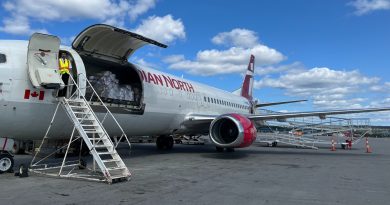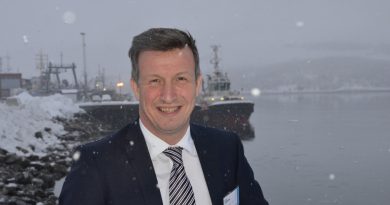Inuit in Canada and Greenland seek co-management of crucial Arctic habitat
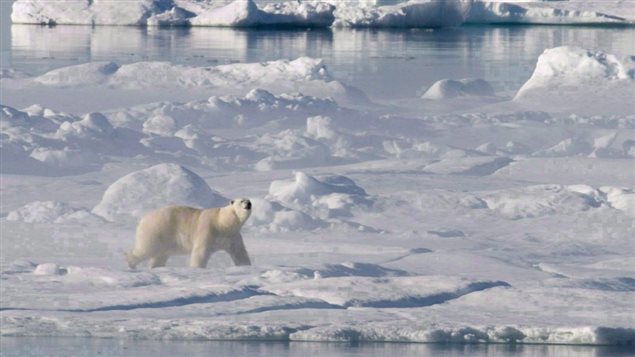
The Inuit of Canada and Greenland are calling on Ottawa and Copenhagen to create an Inuit-managed protected area in the North Water Polynya in Baffin Bay, a crucial Arctic habitat located in the waters between Canada’s Ellesmere Island and the northwestern coast of Greenland.
The Inuit Circumpolar Council’s Pikialasorsuaq Commission also wants Canada and Denmark to reinstate the free movement between historically connected Inuit communities on the Canadian and Greenlandic coastlines.
The North Water Polynya, or Pikialasorsuaq as it is known in Inuktitut, is an area of year-around open water surrounded by sea ice. It is one of the most biologically productive areas in the circumpolar Arctic and is a breeding ground and migration area for animals such as narwhal, beluga, walrus, bowhead whales and migratory birds.
It is also of tremendous cultural and economic importance for the Inuit who have depended on its bounty for their survival for millennia.
Grassroots effort
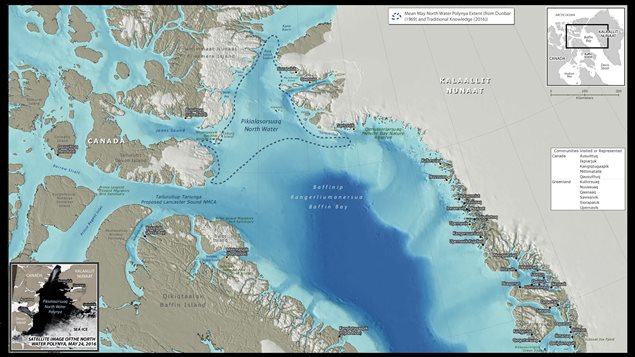
The recommendations are part of the first major report released by the commission on Thursday entitled “People of the Ice Bridge: The Future of Pikilalasorsuaq.”
In a news release, Inuit leaders from Greenland and Canada praised the initiative.
“The Pikialasorsuaq Commission process has been developed from the bottom up and it is clear Inuit of the Pikialasorsuaq want to lead the management of this area,” said Okalik Eegeesiak, chair of the Inuit Circumpolar Council.
“Greenland and Canada share an Arctic treasure,” said Kuupik Kleist, the Greenlandic commissioner and former premier of Greenland.
“We heard loud and clear from citizens in communities that are connected with Pikialasorsuaq that they want steps to be taken to protect it for future generations.”
The Inuit from the communities adjacent to Pikialasorsuaq want to be involved in the management and monitoring of this unique ecosystem, Kleist said.
“They recognize that the health of the species upon which they depend is connected to the health of the Pikialasorsuaq,”
The Commission is seeking support from governments to implement the recommendations in the report.
“It will take all levels of governments to realize this most important step in Inuit self-determination and management of their lands and waters,” said Eva Aariak, Canadian commissioner, and former premier of Nunavut. “The Commission and the ICC urge the governments of Canada, Greenland and Denmark to work with Inuit and create a positive future for the Pikialasorsuaq and its peoples.”
An area under threat
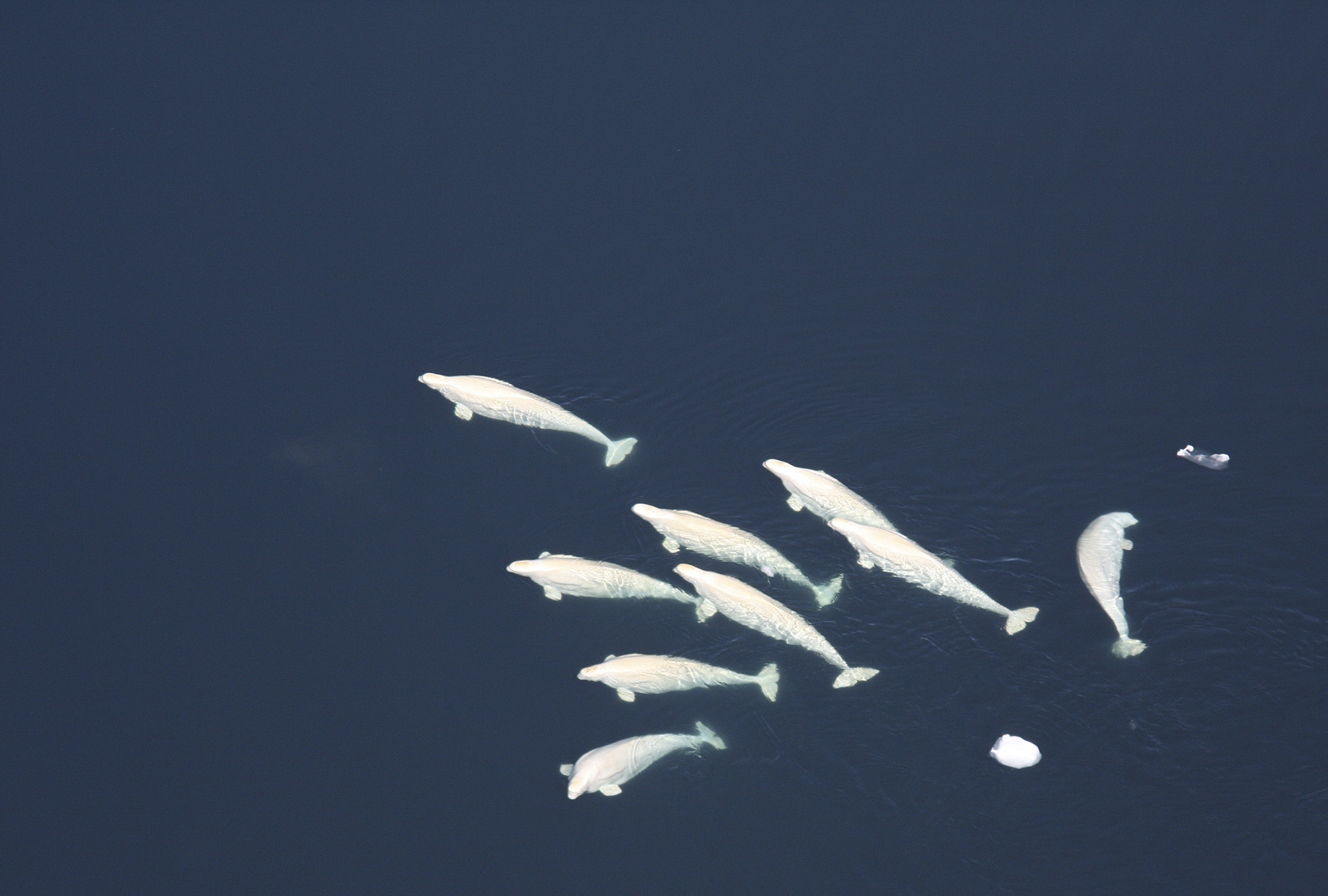
Michael Byers Michael Byers, Canada Research Chair in Global Politics and International Law at the University of British Columbia, said Inuit co-management of Pikialasorsuaq on behalf of Canada and Denmark was an “excellent idea” for several reasons.
“First, of all this is a place that is of an extreme cultural and economic importance for the Inuit of Canada and Greenland,” Byers said in an interview with Radio Canada International. “It’s the most biologically important place in the entire Arctic. It has incredible populations of narwhal, of bowhead whales, of seals, polar bears. It’s literally the refrigerator in which the food is stored for the local Inuit.”
The Inuit also know the area better than anyone else, Byers said.
“They have thousands of years of traditional knowledge, of Inuit science, and therefore are better able to make decisions than a government in Ottawa or Copenhagen,” Byers said.
And the final reason is that the North Water Polynya is under threat, he said.
“It’s under threat from climate change, it’s under threat from increased shipping, from increased tourism,” Byers said, “it’s under threat from the possibility of fuel from Russian rocket stages landing in the area.”
Precedents already exist
The Pikialasorsuaq area falls under Canada’s and Denmark’s exclusive economic zones and as long as the two nations agree on a co-management scheme, there is nothing preventing them from exercising their rights in the area, said Byers who’s one of Canada’s leading experts on international law and the Arctic.
There are lots of precedents of such arrangements around the world, he said.
“There is an agreement between the Inuit of the Western Canadian Arctic and the Inupiat of Alaska on the co-management of polar bears in the Beaufort Sea,” Byers said. “That agreement is between the two Indigenous peoples but it has been supported by the governments of the United States and Canada.”
There are also cases of condominium arrangements of declared shared sovereignty between nation states, he said.
“One example of this is Pheasant Island, which is in the middle of a river on the border between France and Spain, and that island is co-managed by two municipalities – one on the French side, the other on the Spanish side – and has been co-managed successfully for hundreds of years,” Byers said.
“So, it’s easy from a legal perspective, it’s just a question of political will and the federal government in Ottawa is all about co-operation with Inuit and First Nations, it’s all about reconciliation. This is a prime opportunity to put those words into action.”
The office of Minister of Crown-Indigenous Relations and Northern Affairs Carolyn Bennett could not be reached for comment in time for publication.
In August, the Liberal government, the Territory of Nunavut and the Qikiqtani Inuit Association announced that they’ve reached an agreement on the final boundary for a national marine conservation area (NMCA) in the Lancaster Sound, not far from Pikiliasorsuaq.
The new conservation area on the eastern approach to the fabled Northwest Passage will protect a large part of the sound, also known under its Inuktitut name as Tallurutiup Imanga.
Related stories from around the North:
Canada: Inuit traditional knowledge to guide marine management plan off Labrador coast, Radio Canada International
Finland: Sami group occupies island in northern Finland to protest fishing rules, Yle News
Norway: Political support for Norwegian Truth and Reconciliation Commission, The Independent Barents Observer
Sweden: Treatment of Sami people among Swedish shortcomings : Amnesty International report, Radio Sweden
Russia: More protected lands on Nenets tundra in Arctic Russia, The Independent Barents Observe
United States: U.S. transportation secretary announces efforts to speed up project development in Alaska, Alaska Dispatch News

